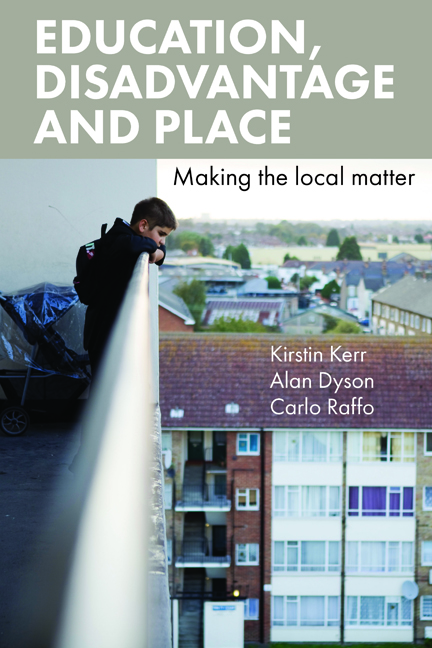Book contents
- Frontmatter
- Contents
- List of tables and figures
- Notes on authors
- Acknowledgements
- one Introduction
- two Why place matters in education
- three Local education systems as products of place: a case study
- four Learning from the past
- five Learning from the present
- six A rationale for a new generation of area-based initiatives
- seven Developing understandings of place as a basis for intervention
- eight Evaluation and monitoring
- nine Governance and accountability
- ten Children and places in hard times: some concluding thoughts
- References
- Index
three - Local education systems as products of place: a case study
Published online by Cambridge University Press: 25 February 2022
- Frontmatter
- Contents
- List of tables and figures
- Notes on authors
- Acknowledgements
- one Introduction
- two Why place matters in education
- three Local education systems as products of place: a case study
- four Learning from the past
- five Learning from the present
- six A rationale for a new generation of area-based initiatives
- seven Developing understandings of place as a basis for intervention
- eight Evaluation and monitoring
- nine Governance and accountability
- ten Children and places in hard times: some concluding thoughts
- References
- Index
Summary
In this chapter, we want to provide an empirical illustration of our arguments that place matters in shaping educational outcomes, and that future area-based initiatives (ABIs) must therefore be bespoke to the places in which they operate. To do this, we present the case of Stockborough (a pseudonym), a mill town in the north of England, where between 2006 and 2011, we were closely involved in efforts to address the relationship between education and disadvantage. One of us (Dyson) was a member of a university team that supported a network of Stockborough secondary schools to enhance equity in their own institutional contexts (for an account of the Stockborough Equity Research Network, see Ainscow et al, 2012). Another of us (Kerr) led two successive research studies in the town. The first explored how children and families accessed and experienced education locally, and the second focused on the impact of nationally initiated, joined-up policy approaches to tackling disadvantage, and education's role within these. These studies involved interviews and focus groups with children, parents and community members, faith leaders, councillors, voluntary sector workers, and professionals in local authority (LA) services and schools. The data we report come from these studies.
The town context
Stockborough has a population of about 85,000, and is the largest population centre in its local authority. It is relatively isolated, connected by road to other smaller towns and villages, and located on the edge of moorland. The town has distinctive residential areas, which are also relatively isolated from one another; there are good transport links to the town centre, but not so between residential areas themselves. There are, however, three cities within a 35-mile radius of Stockborough and the town has good rail and motorway connections to these.
Like many northern towns, Stockborough grew during the mid-to late 19th century as a centre for the textile industry. The town's housing stock reflects this heritage, including areas with narrow streets of two-up-two-down terraced housing and areas with larger Victorian villas. There are also social housing estates and high-rise buildings built between the 1930s and 1960s as town centre slum areas were cleared. By the latter part of the 20th century, the town's textile industry was in sharp decline and its last working mill closed in the early 1980s. Employment opportunities in the town are now very limited and are overwhelmingly concentrated in small businesses.
- Type
- Chapter
- Information
- Education, Disadvantage and PlaceMaking the Local Matter, pp. 47 - 64Publisher: Bristol University PressPrint publication year: 2014



